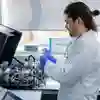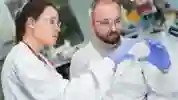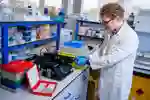




Build the advanced research techniques you need to drive innovation that saves lives.
You’ll learn within cutting-edge facilities. At a university that’s located at the heart of strong biotechnology industry, close to leading companies such as Smith & Nephew and Reckitt.
You’ll be taught by research-active staff. Gain an in-depth understanding of the underlying generic, biological, physiological, and cellular causes of diseases and how they can be treated. And graduate with the advanced knowledge and research design and data analysis skills you need for a research-lab career.
About this course
You’ll take part in lectures, problem-solving exercises and practical sessions. Explore the ethical and moral consequences of research in this subject area. Build critical thinking and data evaluation skills. And complete a research project in a biomedical science topic of your choice.
You’ll benefit from our strong connections with industry. Supported by a personal tutor throughout your studies, you’ll also have regular contact with experienced researchers working in the biomedical field. And get to hear from guest speakers in the field such as clinical staff from local hospitals.
Our programmes are informed by the latest innovation and research. With research-led teaching that builds on our long-established collaboration with external researchers across industry, the NHS and other universities.
Researchers at Hull are addressing some of the major challenges in biomedical research and practice. We collaborate with clinical researchers, the Hull University Teaching Hospitals NHS Trust, and industry to understand and tackle multimorbidities, for example. And we’ve been pioneering lab-on-a-chip technology since its inception in the 1990's.
You will experience the expertise of academics across the University and Hull York Medical School who are at the forefront of biomedical and health research – enabling you to develop the skills and expertise you need to become a leader in your chosen field of biomedical science.

MSc Biomedical Sciences
1 min
Module options
For a full Masters degree, you'll study 180 credits over the duration of your course. Some programmes offer a Postgraduate Diploma (PGDip) qualification or a Postgraduate Certificate (PGCert) qualification. For a PGDip, you'll study 120 credits, and for a PGCert, you'll study 60 credits.
Filters
Bench to Bedside I: Design and Discovery
Examine the work that goes on before a drug is given to humans. This will include learning the core concepts of drug design, from target selection, through in vitro and appropriate testing and thinking about the most suitable formulation. You will also have the opportunity to visit testing facilities and receive input from members of the pharmaceutical industry.
core
20 credits
Analytical Skills in Pharmacology
Gain experience of specific analytical laboratory techniques as a means of illustrating key techniques used within the process of drug development. The module will include specific detail relating to governance and ethics before considering contemporary analytical methods that are used currently in drug discovery.
core
20 credits
Research Methods (Biomedical Sciences)
You will be given both theoretical insight and practical experience in laboratory methods used in Biomedical Sciences research. At the end of this module, you will gain the ability to statistically analyse data, choosing the correct tests to use and understand the results. The practical and analytical competencies you will acquire from this module will provide you with the foundation to enable completion of your dissertation in the Research Project in Biomedicine module and provide professional skills that will be an asset to your future career in biomedical research.
core
20 credits
Diseases in Biomedicine
Research in biomedical science underpins our understanding of human diseases and provides insight into their effective management and treatment. In this module, you will study select areas of cardiac and vascular dysfunction, haematological diseases, and disorders to gain an understanding of the disease states with current therapeutic treatment, and discussion of future therapies.
core
20 credits
Infection and Immunity
Infections cause substantial disease, accounting for over a quarter of deaths around the world. Through this module, you will gain advanced knowledge of microbiology and immunology, exploring pathogen-host interactions, the immune response to infection, pathogenesis, and the mechanisms involved in protection against infection and vaccination. You will additionally gain understanding of how ageing populations, climate change, sprawling urbanization, migration, and ease of travel impact the infection burden and the emergence of new infectious diseases.
core
20 credits
Current Topics
You will be offered a diverse range of topics that focus on a current topical aspect in Biomedical Sciences. You will discuss your chosen topic and formulate a workplan with your academic supervisor, who will support you to independently write an in-depth scientific review of your chosen topic. In addition, you will be supported by workshops facilitated by the module leader, and further supported by the Skills team.
core
20 credits
Research Project in Biomedicine
You will take part in a designed research project that puts into practice the skills that you learn during the taught modules on the programme. Under the supervision of an expert academic researcher you will conduct original research, develop critical skills, and acquire direct experience of relevant research methodologies. This module will prepare you for your career in scientific research, as you will gain competencies and relevant experience of working in an academic research environment.
core
60 credits
Our academics
Our academics specialise in areas including cancer imaging, microfluidics in cardiovascular research, haemostasis, diabetes, metabolism, respiratory and wound healing.
Researchers in our Biomedical Institute for Multimorbidity carry out work to understand the complex interplay between diseases.

Professor John Greenman
Professor of Tumour Immunology
John is a highly experienced tumour immunologist and develops lab-on-a-chip technology for analysing tumour biopsies. He’s published 180 peer-reviewed publications and his immunobiology group works closely with clinicians, chemists and engineers.

Dr Dan Hampshire
Lecturer in Genetics
Dan’s research identifies genetic factors that contribute to our susceptibility to bleeding and thrombosis. And the role these can play in determining clinical outcomes for patients with acute coronary syndromes following treatment.
Entry Requirements
What do I need?
When it comes to applying for this Postgraduate Taught degree, you'll need an Undergraduate degree (or equivalent). For this course, you'll need a 2:1 from a relevant bachelor's degree.
The programme is designed for graduates who have studied a subject that is relevant to this course.
If you’re an undergraduate student at Hull, you’re guaranteed a fast-track route to this postgraduate degree, as long as you meet the entry requirements.
In order to ensure our students have a rich learning and student experience, most of our programmes have a mix of domestic and international students. We reserve the right to close applications early to either group if application volumes suggest that this blend cannot be achieved.
Typical offer
2:1 in a relevant subject area
At least a 2.1 Honours degree (or international equivalent) in Biomedical Sciences, or related degree in a life science subject.
Fees & Funding
How much is it?
Tuition fees for 2027 entry have not been confirmed. Please use 2026-27 information as a guide.
Scholarships
We offer a number of awards, bursaries and scholarships for eligible students. They’re awarded for a variety of reasons including academic achievement and/or to help those on lower incomes.
Scholarships and bursaries are separate to student loans. And the best bit is, you don’t pay a penny back.
Alumni Postgraduate Scholarship
University of Hull undergraduates progressing to a taught masters course may receive a 20% discount on the cost of their tuition fees.
Find out if you’re eligible by visiting the University of Hull Alumni Postgraduate Scholarship page.
See more Scholarships
We offer a range of scholarships and awards to students at the university to help with their financial load.
To view all of our scholarships and determine whether you're eligible, please visit our Scholarships and Awards page.
Our facilities



Future prospects
You’ll graduate with skills that are at the forefront of medical science research, ready for a career in this dynamic field where continual advancements in healthcare and science drive innovation and research.
You could progress to further study with a PhD, or a research-lab career. You’ll be able to take research-focused roles in academic and industry – in sectors such as health and pharmaceutical.
Our graduates have gone on to secure roles within the NHS, Medical Research Council, and government-funded and private pathology laboratories.
Take your career to the next level
Like what you’ve seen? Then it’s time to apply.
Make your application online now, and our admissions team will get back to you as soon as possible to make you an offer.
Not ready to apply yet?
We regularly deliver virtual and on-campus events to help you discover your perfect postgraduate course, whether it’s a subject you already love or something completely different. Our events are an opportunity for you to chat to tutors and current students and find out about the career options a postgraduate degree could lead to.
You may also be interested in...
All modules on this course page are subject to availability and this list may change at any time.